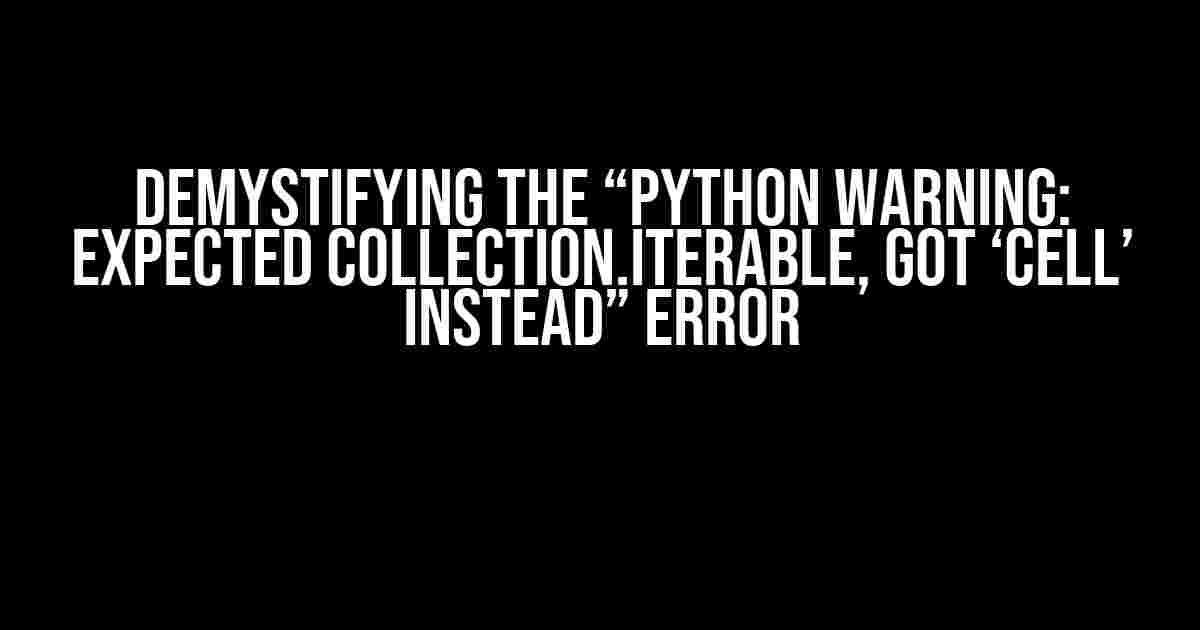If you’re reading this, chances are you’ve encountered the frustrating “Python warning: Expected Collection.Iterable, got ‘cell’ instead” error. Don’t worry, you’re not alone! This warning can be perplexing, especially for those new to Python. Fear not, dear reader, for we’re about to embark on a journey to tame this beast and get your code running smoothly.
What’s causing the error?
The warning typically occurs when you’re working with pandas DataFrames or Series and attempting to perform an operation that expects an iterable (such as a list, tuple, or set) but receives a single cell value instead.
import pandas as pd
df = pd.DataFrame({'A': [1, 2, 3], 'B': [4, 5, 6]})
# Attempting to iterate over a single cell value
for cell in df['A'][0]:
print(cell)
Understanding the iterable concept
In Python, an iterable is an object that can be iterated over, meaning you can loop through its elements one by one. Examples of iterables include lists, tuples, sets, and even strings. When you try to iterate over a single value, like a cell in a pandas DataFrame, Python gets confused because it’s not an iterable.
Resolving the warning
Now that we understand the root cause, let’s explore some solutions to resolve this warning:
Solution 1: Iterate over the entire column
If you want to iterate over the entire column, simply remove the indexing:
import pandas as pd
df = pd.DataFrame({'A': [1, 2, 3], 'B': [4, 5, 6]})
for cell in df['A']:
print(cell)
Solution 2: Convert the cell value to a list
If you must iterate over a single cell value, convert it to a list using the list() function:
import pandas as pd
df = pd.DataFrame({'A': [1, 2, 3], 'B': [4, 5, 6]})
for cell in list(df['A'][0]):
print(cell)
Solution 3: Use the .iteritems() method
When working with DataFrames, you can use the .iteritems() method to iterate over the column names and their corresponding values:
import pandas as pd
df = pd.DataFrame({'A': [1, 2, 3], 'B': [4, 5, 6]})
for col, series in df.iteritems():
print(f"Column: {col}")
for value in series:
print(f" {value}")
Real-world scenarios and gotchas
Let’s explore some common scenarios where this warning might occur and how to tackle them:
Scenario 1: Iterating over a Series
When working with a pandas Series, you might encounter this warning if you try to iterate over a single value:
import pandas as pd
s = pd.Series([1, 2, 3])
for value in s[0]:
print(value)
Solution: Iterate over the entire Series or convert the value to a list, just like in our previous solutions.
Scenario 2: Using .apply() with a lambda function
When using the .apply() method with a lambda function, you might encounter this warning if the lambda function returns a single value:
import pandas as pd
df = pd.DataFrame({'A': [1, 2, 3]})
def my_lambda(x):
return x[0]
df['A'].apply(my_lambda)
Solution: Ensure your lambda function returns an iterable, or use the .apply() method with a function that returns an iterable.
Gotcha: pandas version compatibility
Keep in mind that the behavior of pandas might change between versions. In pandas 1.3.0 and later, the warning is raised more frequently to encourage better coding practices.
Best practices and conclusion
To avoid the “Python warning: Expected Collection.Iterable, got ‘cell’ instead” error:
- Iterate over entire columns or Series instead of single values.
- Use the
list()function to convert single values to iterables. - Be mindful of pandas version changes and adapt your code accordingly.
- Test your code thoroughly to catch any unexpected warnings or errors.
By following these guidelines and understanding the underlying concepts, you’ll be well-equipped to tackle this warning and write more efficient, Pythonic code. Happy coding!
| Solution | Description |
|---|---|
| Iterate over entire column | Remove indexing to iterate over the entire column. |
| Convert cell value to list | Use the list() function to convert the cell value to an iterable. |
Use .iteritems() method |
Iterate over column names and their corresponding values using the .iteritems() method. |
Frequently Asked Question
Ever encountered the pesky “Expected Collection.Iterable, got ‘cell’ instead” warning in Python? Don’t worry, we’ve got you covered! Here are some burning questions and their answers to help you tackle this issue.
What does this warning mean, anyway?
This warning typically occurs when you’re trying to pass a single ‘cell’ object to a function or method that expects a collection of iterable objects. Think of it like trying to feed a cookie to a cookie jar that’s only designed to hold multiple cookies!
Why does Python throw this warning instead of a full-blown error?
Python is trying to be helpful! By throwing a warning, it’s giving you a chance to catch and fix the issue before it becomes a bigger problem. It’s like your Python guardian angel whispering, “Hey, you might want to check this out…”
How do I fix this warning in my code?
Easy peasy! Simply wrap your ‘cell’ object in a list or some other iterable collection. For example, if you’re passing it to a function, try `function([cell])` instead of `function(cell)`. Voilà! The warning should disappear like magic!
Are there any alternative ways to handle this warning?
You bet! Depending on your specific use case, you might want to consider using a more explicit conversion to an iterable, like `function(iter([cell]))`. Or, if you’re feeling fancy, you could refactor your code to handle single ‘cell’ objects differently than collections. Get creative, Pythonista!
Will this warning affect the performance of my Python script?
Fear not, friend! This warning itself won’t slow down your script. However, if you’re not addressing the underlying issue, you might see performance impacts depending on how your code is structured. So, take a minute to fix the warning, and your script will thank you!
